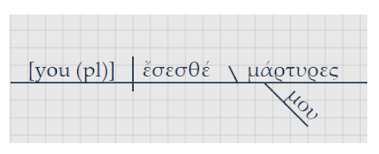31 August 2023
I'm adding the information below as a post; later, I'll make it available as a page, so that it can always be accessed from the 'Page list' on the Home page, (above).
The full set of polytonic Greek diacritics includes:
3 accents: acute, grave, circumflex
2 breathings: smooth and rough
iota subscript
diaeresis (two small dots placed above a vowel)
The system is more complicated than this, however, because the diacritical marks can be combined. An 'α', for example can have a breathing, an accent, and an iota subscript: ᾄ
You may want to be able to type the whole nine yards of polytonic Greek. You may not. But if you do, suggested instructions for a PC are below. (I don't have a desktop Apple product, and don't know the procedure there.)
Step 1
Enable polytonic Greek on your system. I admit this may not be as easy as it sounds, because it seems like the procedure can be different for every computer, and every edition of Windows. Try the following:
Find SETTINGS.
Go to TIME & LANGUAGE.
Go to LANGUAGE & REGION.
Click on ADD A LANGUAGE.
You will need to scroll through a long list, but should eventually be able to find both 'Greek' and 'polytonic Greek'.
If that procedure doesn't work on your system, look for anything having to do with 'control panel', 'settings', 'keyboard', 'language', etc.
Next time; the Greek keyboard, followed by key combinations for typing the diacritics.

